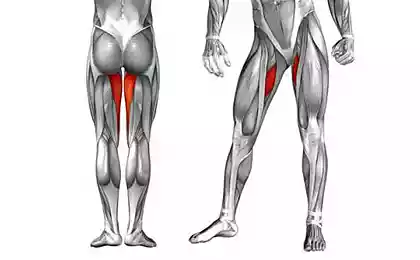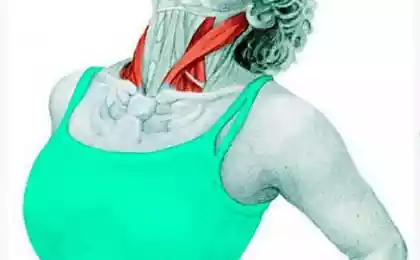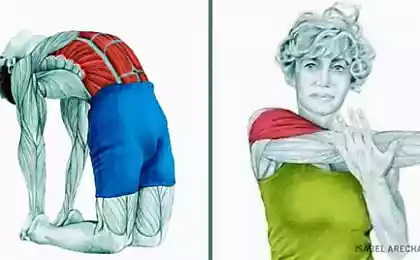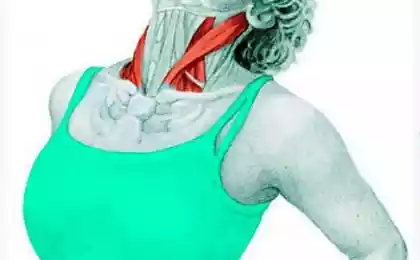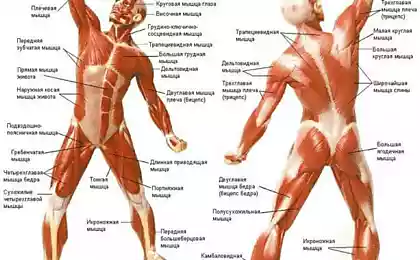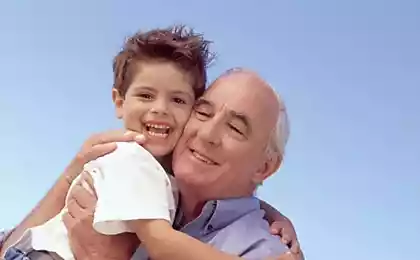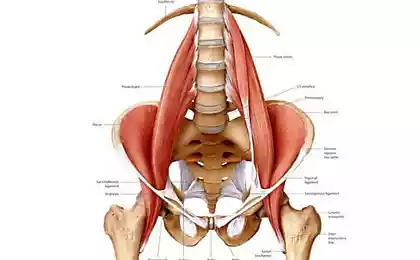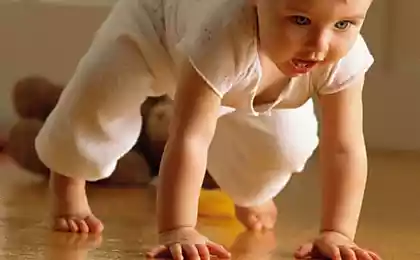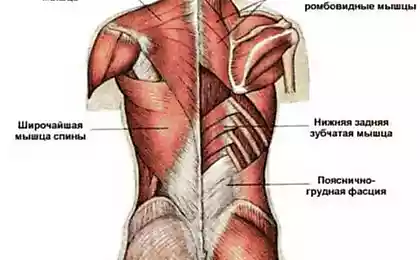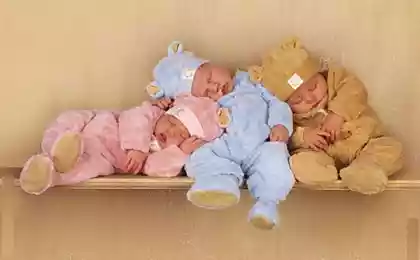429
Why not leave the baby in the playpen for a long time
We all want our children to grow up healthy, strong, beautiful. All we are trying to create the most favorable conditions for their development, learning and formation. Try to surround them with love and comfort. Civilization also helps us in this: on the market appear more and more new things to facilitate the care of the baby and accelerate his development.
But not if we abuse these things? Not do we ensure that our children forget what perseverance, overcoming challenges, commitment, belief in yourself? Not too artificially created environment safe?
Twenty one million five hundred twenty four thousand three hundred forty nine
I suggest you read the quote from the book "How to raise a child happy. The principle of continuity," American psychologist Jean Liedloff. Jean lived for some time with the Indians in the Amazon jungle, and watched the relationship between parents and children, and on his return wrote a book that greatly influenced modern pedagogy.
"The sense organs of the child receive a huge and various material in the form of events and objects in order to train and improve their activity and interaction with the brain.
His first experience of the child basically gets away from the body of a busy mother. Its continuous movement and activity give to the baby idea of active life. Gradually it acquires that movement this one of properties of this world which will always associate with the cozy feeling of egoism opened in the "manual."
The opposite happens if the child is mostly in the hands of a man who prefers to sit without movement. Of course, it saves the baby from the agony of loneliness, feelings of uselessness and isolation, however, will not allow him to feel the pace of life and actions. If the child actively encourages adults to stimulation of his sense organs, it is the first sign that he needs movement for its further development. A little moving mother gives to the kid idea of life as about something boring and viscous that causes in it restlessness and fussiness signs of a lack of stimulation from the mother. He will fidget and jump up and down on her knees, showing the desires, or to wave a hand, suggesting mother to move quicker.
Similarly if mother treats the child like a fragile crystal vase, it would seem that he's got. Conversely, a rude and cavalier treatment will allow him to feel strong, hardy, able to adapt to any conditions and situations. The child does not just hate this feeling of fragility, weakness and vulnerability, it disturbs further development and creates problems at an older age."
Jean Liedloff, "How to raise a child happy. The principle of continuity»
Here is an observation of the author on the role of the movement in non-verbal communication between child and mother.
Indeed, the mother and child are in constant communication and fellowship with each other. The child learns the world through the mother. He discerns any change in her emotional state, evaluates posture, movements, voice. He literally reads it-aligning in the world. This connection is established gradually, since the time when the baby is in the womb, and in some way similar to telepathy. When the baby grows up, he learns to understand not only his mother but also the world around him.
Active learning starts with crawling. This is a new very important step in your child's life concerning his health and development. It prepares the child crawling to walking: strengthens muscles, develops the joint and ligamentous apparatus, which prepares the body for future loads. Crawling is an important stage of formation of a healthy musculoskeletal system. Often parents don't give a crawl of great value, trying to immediately put the baby on the legs and learn to walk. Hurry. The child needs to pass each stage of its development consistently, as intended by nature for his benefit. Getting up and practicing walking on all fours, in the future, the child will avoid such common diseases as scoliosis and flat feet. In addition, holding your body, the child learns proper coordination — a skill that will come in handy when swimming, playing ball, riding a bike.
When the baby successfully mastered crawling — he can quickly and securely move in space.It is perfectly develops his brain structure:
Therefore, limiting the child's mobility, may contribute to delay in intellectual development.
It is important to give the baby a chance for active knowledge of this world from the first interest in him.
Now, more and more we notice that the child is creating the conditions "of the quiet stay at home too;" using the playpens and slings. Yes, of course, these devices are convenient for parents.
In this case in a sling the child sees everything that is moved is in the center of events, but absolutely no effort! All that is of interest to the baby, then he is under his nose. Convenient, easy. But it is possible that in the future it will have to pay. Excessive guardianship and care of parents, too often leads to the fact that the child has no need in walking, talking, thinking, which again inhibits its development. Such child:
The same applies to the arena. It is also convenient to use. But kids need to create a place for active movements, for learning, overcoming obstacles and difficulties. It is not only a positive impact on his body, but harden it in nature and teaches that to achieve your goal you need to make the effort. Such a child more likely to grow diligent, patient, resilient and strong.
The relationship between a child and parents play a huge role and are the basis of all later life. The way parents show a new world baby, it will be his to take.
Also interesting: How to teach a child to hear from you: 7 steps
Don't say "No" to a child or How to negotiate with the three-year period
In early childhood we, as children, determined by the environment in which it had fallen, and all his life to build a relationship with her. It is therefore very important to ensure that the baby was developing perfectly and correctly.published
Author: Katerina Burkina
Source: katerinaburkina.ru/mama_i_malish_dvizhenie.html
But not if we abuse these things? Not do we ensure that our children forget what perseverance, overcoming challenges, commitment, belief in yourself? Not too artificially created environment safe?
Twenty one million five hundred twenty four thousand three hundred forty nine
I suggest you read the quote from the book "How to raise a child happy. The principle of continuity," American psychologist Jean Liedloff. Jean lived for some time with the Indians in the Amazon jungle, and watched the relationship between parents and children, and on his return wrote a book that greatly influenced modern pedagogy.
"The sense organs of the child receive a huge and various material in the form of events and objects in order to train and improve their activity and interaction with the brain.
His first experience of the child basically gets away from the body of a busy mother. Its continuous movement and activity give to the baby idea of active life. Gradually it acquires that movement this one of properties of this world which will always associate with the cozy feeling of egoism opened in the "manual."
The opposite happens if the child is mostly in the hands of a man who prefers to sit without movement. Of course, it saves the baby from the agony of loneliness, feelings of uselessness and isolation, however, will not allow him to feel the pace of life and actions. If the child actively encourages adults to stimulation of his sense organs, it is the first sign that he needs movement for its further development. A little moving mother gives to the kid idea of life as about something boring and viscous that causes in it restlessness and fussiness signs of a lack of stimulation from the mother. He will fidget and jump up and down on her knees, showing the desires, or to wave a hand, suggesting mother to move quicker.
Similarly if mother treats the child like a fragile crystal vase, it would seem that he's got. Conversely, a rude and cavalier treatment will allow him to feel strong, hardy, able to adapt to any conditions and situations. The child does not just hate this feeling of fragility, weakness and vulnerability, it disturbs further development and creates problems at an older age."
Jean Liedloff, "How to raise a child happy. The principle of continuity»
Here is an observation of the author on the role of the movement in non-verbal communication between child and mother.
Indeed, the mother and child are in constant communication and fellowship with each other. The child learns the world through the mother. He discerns any change in her emotional state, evaluates posture, movements, voice. He literally reads it-aligning in the world. This connection is established gradually, since the time when the baby is in the womb, and in some way similar to telepathy. When the baby grows up, he learns to understand not only his mother but also the world around him.
Active learning starts with crawling. This is a new very important step in your child's life concerning his health and development. It prepares the child crawling to walking: strengthens muscles, develops the joint and ligamentous apparatus, which prepares the body for future loads. Crawling is an important stage of formation of a healthy musculoskeletal system. Often parents don't give a crawl of great value, trying to immediately put the baby on the legs and learn to walk. Hurry. The child needs to pass each stage of its development consistently, as intended by nature for his benefit. Getting up and practicing walking on all fours, in the future, the child will avoid such common diseases as scoliosis and flat feet. In addition, holding your body, the child learns proper coordination — a skill that will come in handy when swimming, playing ball, riding a bike.
When the baby successfully mastered crawling — he can quickly and securely move in space.It is perfectly develops his brain structure:
- skills of spatial orientation, which in the future will affect the progress in geometry and writing;
- logical thinking;
- the ability to draw, to build a composition;
- use of map and much more.
Therefore, limiting the child's mobility, may contribute to delay in intellectual development.
It is important to give the baby a chance for active knowledge of this world from the first interest in him.
Now, more and more we notice that the child is creating the conditions "of the quiet stay at home too;" using the playpens and slings. Yes, of course, these devices are convenient for parents.
In this case in a sling the child sees everything that is moved is in the center of events, but absolutely no effort! All that is of interest to the baby, then he is under his nose. Convenient, easy. But it is possible that in the future it will have to pay. Excessive guardianship and care of parents, too often leads to the fact that the child has no need in walking, talking, thinking, which again inhibits its development. Such child:
- can grow Moody;
- their speech usually develops slowly;
- basic skills, which are laid before the age of two years do not have time to form.
The same applies to the arena. It is also convenient to use. But kids need to create a place for active movements, for learning, overcoming obstacles and difficulties. It is not only a positive impact on his body, but harden it in nature and teaches that to achieve your goal you need to make the effort. Such a child more likely to grow diligent, patient, resilient and strong.
The relationship between a child and parents play a huge role and are the basis of all later life. The way parents show a new world baby, it will be his to take.
Also interesting: How to teach a child to hear from you: 7 steps
Don't say "No" to a child or How to negotiate with the three-year period
In early childhood we, as children, determined by the environment in which it had fallen, and all his life to build a relationship with her. It is therefore very important to ensure that the baby was developing perfectly and correctly.published
Author: Katerina Burkina
Source: katerinaburkina.ru/mama_i_malish_dvizhenie.html
